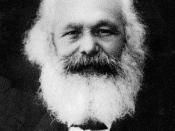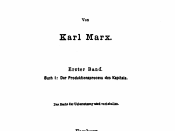Karl Marx's Theory of Alienation
Karl Marx's theory of alienation presents us with a grim view of capitalist society and the dehumanising effect that this society has on the worker. Marx's theory of alienation refers to human beings becoming alienated from the society that, according to Marx, they created. As society develops human beings gradually begin to feel that it is not of their making and they do not feel at home in such a place. Marx's idea of worker alienation refers to the worker being stripped of all his inherent human qualities as a result of the production process, which in turn alienates and estranges him from what he is and what he does. There are four main components in regards to Marx's theory of alienation and in the course of this essay I intend to examine each of these in some detail in order to extract the core meaning of Marx's theory and, in doing so, show this theory's relevance to modern day society.
The Four Components of Marx's Theory of Alienation are:
1. Alienation from the product
2. Alienation from the production process
3. Alienation from the species
4. Alienation from fellow man
1. Alienation from the product
Firstly in the capitalist society Marx points out how the worker becomes alienated from the product he produces. This is as a result of the profit-obsessed economy in which he exists. The worker in this economy cares nothing for the product, he is merely churning out units, as the economy requires. He does not possess nor care for the fruits of his labour; they are simply a stage in the production process. What he produces is for exchange and not for himself. The labourer does not own the product that he produces; it belongs to the 'capitalist'. The 'capitalist'...



Cheers
it really helped me, as i was struggling what to put! thanks again!
1 out of 1 people found this comment useful.